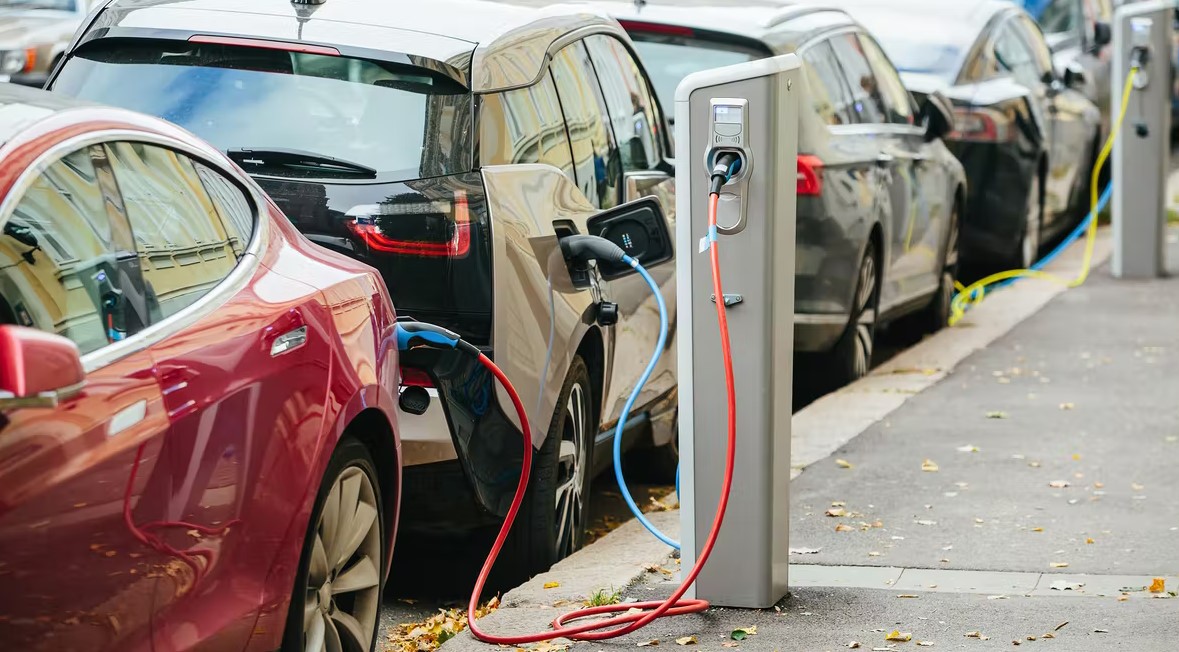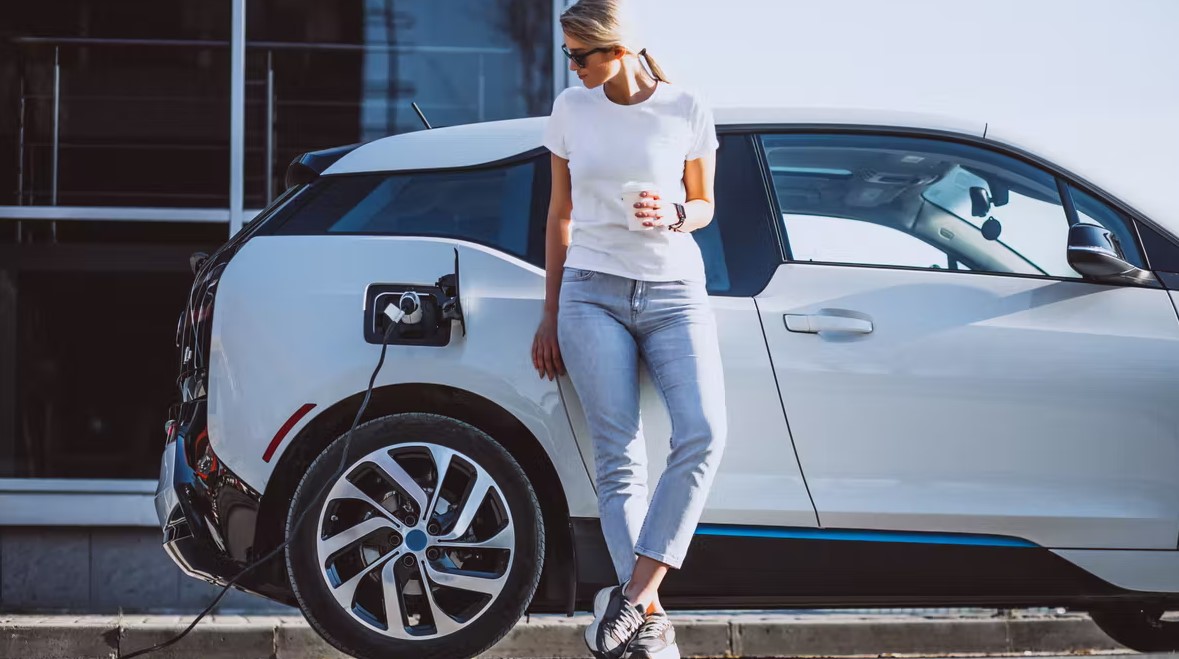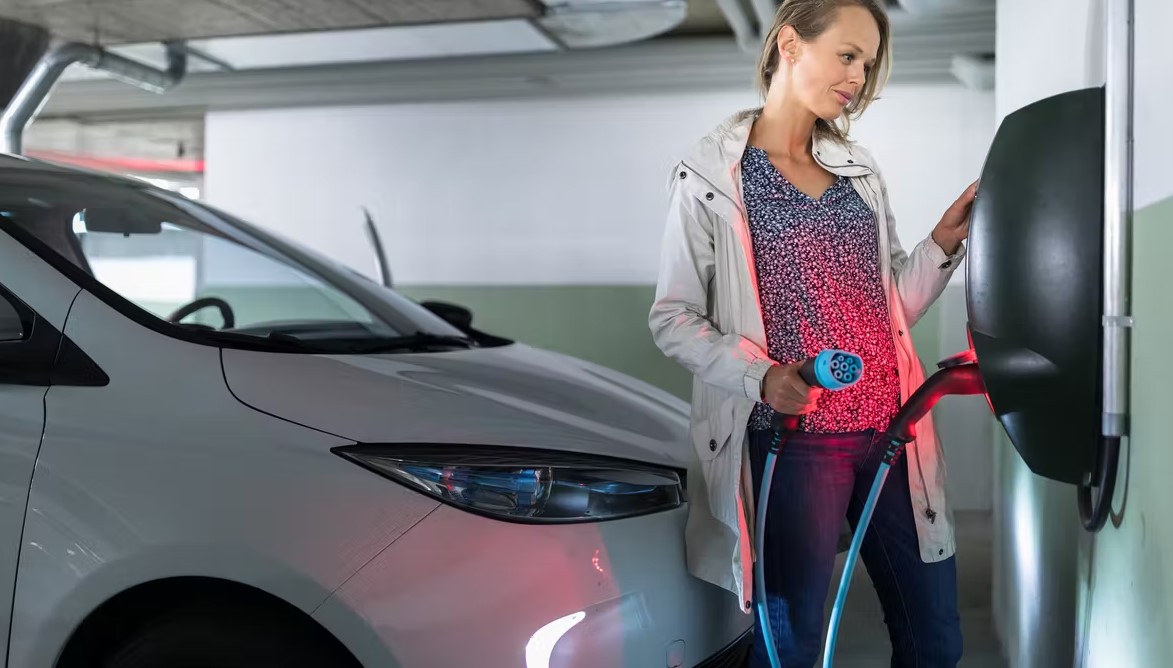Most of us agree that we need to do something about global warming – but debates about whether EVs are part of the solution remain highly charged (excuse the pun).
The issue, for many of us, is trading the ease and convenience of refuelling at the petrol station for tediously long recharging times.
How long does it take to charge an electric car, exactly? Well, there’s no straightforward answer. The top-of-the-range Teslas advertise an 80% recharge in 30 minutes – if you use their dedicated Supercharger Network.
In this post we explain why this is, and what the future of EV charging holds.

How to calculate charging time
The time it takes to charge an electric car can be easily calculated using the following formula:
Battery size ÷ charging power = charge time
For example, if a Tesla Model 3 Long Range has a 75kwh battery pack and you decide to use a 50kw rapid charger, it would take approximately an hour and a half to reach a full battery:
75kwh ÷ 50kw = 1.5 hours
You can read more about how many kWh it takes to charge an electric car here.

Estimated charging time by vehicle
To make things a little easier, we’ve provided a list of the EV charger types, expected ranges and charging times for some of the most popular BEVs and PHEVs on the market right now:
Nissan Leaf (2018-)
Connectors: Type 2, CHAdeMO
Battery Capacity: 40kwh
Maximum Charging Rate: 46kw
Range: 143 miles
3.7kw slow charging: 11hrs
7.4kw fast charging: 6hrs
50kw rapid DC charging*: 1hrs
Tesla Model S (2019)
Connectors: Type 2, CCS
Battery Capacity: 75kwh
Maximum Charging Rate: 140kw
Range: 238 miles
3.7kw slow charging: 21hrs
7.4kw fast charging: 11hrs
50kw rapid DC charging*: 2hrs
150kw rapid DC charging*: 40 mins
Mitsubishi Outlander (PHEV)
Connectors: Type 1, CHAdeMO
Battery Capacity: 13.8kwh
Maximum Charging Rate: 22kw
Range: 24 miles
3.7kw slow charging: 4hrs
7.4kw fast charging: 4hrs
50kw rapid DC charging*: 40mins
Jaguar I-Pace
Connectors: Type 2, CCS
Battery Capacity: 90kwh
Maximum Charging Rate: 262kw
Range: 225 miles
3.7kw slow charging: 27hrs
7.4kw fast charging: 13hrs 30mins
50kw rapid DC charging*: 75 mins
175kw rapid DC charging*: 24 mins
350kw rapid DC charging*: 19 mins
Porsche Taycan
Connectors: Type 2, CCS
Battery Capacity: 79.2kwh
Maximum Charging Rate: 225kw
Range: 245 miles
3.7kw slow charging: 22hrs 45mins
7.4kw fast charging: 11hrs 30mins
50kw rapid DC charging*: 63mins
150kw rapid DC charging*: 24mins
Audi e-tron 50 quattro
Connectors: Type 2, CCS
Maximum Charging Rate: 120kw
Battery Capacity: 71kwh
Range: 175 miles
3.7kw slow charging: 20hrs 45mins
7.4kw fast charging: 10hrs 30mins
50kw rapid DC charging*: 57mins
150kw rapid DC charging*: 25mins
BMW i3
Connectors: Type 2, CCS
Maximum Charging Rate: 49kw
Battery Capacity: 42.2kwh
Range: 145 miles
3.7kw slow charging: 12hrs 15mins
7.4kw fast charging: 6hrs 15mins
50kw rapid DC charging*: 36mins
Renault Zoe
Connectors: Type 2, CCS
Maximum Charging Rate: 46kw
Battery Capacity: 54.7kwh
Range: 195 miles
3.7kw slow charging: 16hrs 45mins
7.4kw fast charging: 8hrs 30mins
50kw rapid DC charging*: 56mins
Honda E
Connectors: Type 2, CCS
Maximum Charging Rate: 50kw
Battery Capacity: 35.5kwh
Range: 105 miles
3.7kw slow charging: 9hrs 15mins
7.4kw fast charging: 5hrs 15mins
50kw rapid DC charging*: 42mins
Kia Soul EV
Connectors: Type 2, CCS
Maximum Charging Rate: 77kw
Battery Capacity: 67.5kwh
Range: 225 miles
3.7kw slow charging: 20hrs 30mins
7.4kw fast charging: 10hrs 30mins
50kw rapid DC charging*: 63mins
150kw rapid DC charging*: 44mins
Volkswagen e-Golf
Connectors: Type 2, CCS
Maximum Charging Rate: 50kw
Battery Capacity: 35.8kwh
Range: 186 miles
3.7kw slow charging: 12hrs
7.4kw fast charging: 5hrs
50kw rapid DC charging*: 35mins
* Rapid charging figures provide the time taken to charge from 10-80%
Data taken from ev-database.uk
Factors affecting charging speed
When it comes to refuelling, petrol and diesel cars are pretty predictable: you remove the fuel cap, insert the nozzle, pull the trigger and within a minute or two you’re ready to get back on the road.
EVs are a little different. Sure, it’s not hard to work out how to charge an electric car. But the time it takes to recharge can vary from 30 minutes to well over 24 hours. The rate at which an EV recharges is determined by multiple factors:
Size of the battery
Just as you’d expect with a fuel tank. The bigger the battery capacity (measured in kwh), the longer it will take to recharge.
State of battery
If you’re charging from empty, it’s going to take longer to reach a full charge. Hardly surprising! However, the rate at which a battery recharges is often described as a ‘charge curve’. This means that the rate at which the battery accepts power is not constant throughout the charging cycle. We explain why this is the case later in this post.
Max charging rate of vehicle
All EVs have a maximum charge rate. If your vehicle’s maximum charge rate is 7kw, it won’t be able to charge any faster using a 22kw chargepoint. Plug-in hybrid electric vehicles (PHEV) and smaller battery electric vehicles (BEV) usually have slower maximum charging rates.
Max charging rate of chargepoint
Not all charging units are created equally! If you’ve bagged yourself a stylish new Tesla Model S then you will also have access to the UK’s Tesla Supercharger network. Tesla Superchargers can be found at most motorway service stations and provide some of the fastest charging speeds currently available, with peak rates of up to 250kw. You could recover up to 200 miles of range in as little as 15 minutes.
Charging stations with a lower power rating, such as your standard home wallbox (7kw) will only provide charge at 7kw, even if your car can charge at higher rates. It could take upwards of 12 hours to achieve a full charge this way.
By far the slowest way to recharge is by using a ‘granny cable’ and a three-pin plug.
The weather
EVs do not like the cold. A colder battery cannot be charged as quickly as a warmer one – even with a rapid charger. Cold weather can also lead to reductions in range.

Chargepoints and charging speeds
Public chargers and home chargers are classified according to three different charging speeds: slow, fast and rapid.
All batteries store DC power. Slow and fast chargers supply an alternating current (AC) directly to the car. The car’s onboard converter then turns this into a direct current (DC) for storage in the battery. Because of the small size of the car’s converter, it can take a lot longer to charge the car using AC power.
Rapid charging stations supply DC power directly to the car’s battery, bypassing the onboard converter. Rapid charging stations use a much larger converter to provide a faster charge.
Why does Rapid EV charging slow down after 80%?
Why do manufacturers choose to advertise the time it takes to reach 80% battery capacity as opposed to a full charge?
Much like ‘rapid charging’ smartphones, EVs charging via DC rapid chargers will slow down around the 80% mark to protect the battery. As a result, we see two very different charging curves when we compare AC charging with DC charging, with the benefits of DC charging becoming less obvious as the battery approaches a full charge.
Batteries are usually rated for a number of discharge ‘cycles’. For instance, Tesla Model S batteries are rated for between 1,000 and 2,000 cycles. One cycle is completed when you’ve discharged an amount equal to 100% of the battery’s capacity – but this doesn’t have to be from one charge (i.e. 100% to 0%).
If you get impatient and decide to unplug before you reach 100% – don’t worry, it won’t damage the battery. Most manufacturers actually recommend keeping your EV battery charged between 20% and 80%. Batteries are under the greatest strain when they are either completely full or completely empty. Keeping within the 20-80% range makes for faster charging and increased longevity.
Should I get an electric car if I can’t charge it at home?
EV charging can seem like a hassle compared to refuelling at a petrol station – but it doesn’t have to be. Electric car charging at home can even save you time. You’ll never have to queue for a petrol station again! Electric car charging at home with no driveway is a little trickier – in most cases, it’s simply impractical. However, there are plenty of things you can do to either reduce the time you spend at public charging points or use it more productively:
Workplace charging
“Working 9 to 5 – what a way to get a charge in!”. Not exactly what Dolly had in mind, but if overnight home charging isn’t possible then you could top up while you’re in the office. If your boss isn’t already aware, the Government’s workplace charging scheme provides generous grants towards the installation of electric car charging points for business. Better still, if your company allows you to charge for free, it won’t be classed as a taxable benefit in kind.
Coffee break
Electric vehicles aren’t the only ones that need to stop and recharge. The highway code recommends that drivers take a break of at least 15 minutes for every two hours of driving – but only 1 in 10 actually do so! Why not grab a cup of coffee while you’re at it?
In-car entertainment
If you’ve ever sat inside a Tesla perhaps the first thing that struck you was the enormous display on the centre console. This is great for satellite navigation, but it also comes packed with arcade games to keep you entertained.
Most new cars come with a couple of USB C ports or a wireless charging pad to keep your smartphone topped up on a long journey. The new Hyundai Ioniq 5 is one of the first EVs to incorporate Vehicle To Load (V2L) technology. This allows you to power pretty much any electrical appliance you can think of, from laptops to hairdryers, and more.
Will EV charging times always be this long?
EV batteries and charging technology has already come a long way since the Mitsubishi i-MiEV and the original Nissan Leaf a little over 10 years ago. In 2011, ‘range anxiety’ was very real.
At Tesla’s recent ‘battery day’, the first 500-mile battery was revealed. The arrival of more energy dense and longer lasting batteries within the next few years should address the concerns of drivers about how often you have to charge an electric car.
Earlier this year we also got a glimpse of StoreDot’s ‘extreme fast charging’ batteries which could see an EV recharge in as little as 5 minutes. If these hit the market, the benefits of internal combustion engines over electric cars would be negligible.
Conclusion
Electric car charging can put a lot of people off. But with a home wallbox, workplace charging, and dedicated EV charging bays appearing in almost every car park, you’ll barely notice the difference. So, what are you waiting for? Check out our best electric car lease deals and make the switch!
If you’re interested in installing a home charger for your EV, Rightcharge is the place to compare home electric car charging points and prices. This is an affiliate link where Lease Fetcher earns money if you choose to go with one of Rightcharge’s providers via Rightcharge. You will not be charged extra for using this link.

